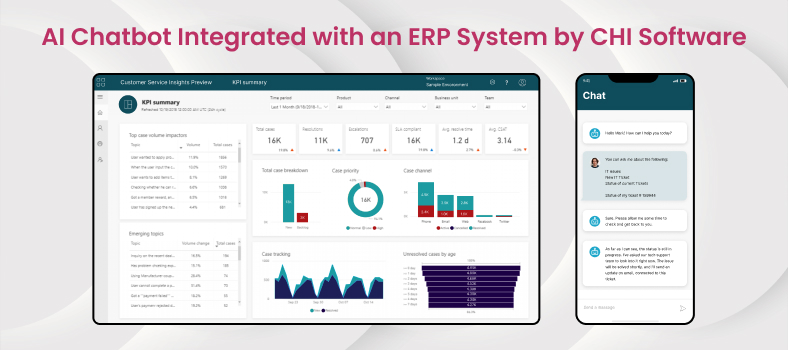Do you know why Enterprise Resource Planning (ERP) systems need chatbots powered by Artificial Intelligence (AI) to truly shine? Read on to learn how ERP AI chatbots make everything a business needs to do work even better.
ERP systems are a powerful and vital tool for modern businesses. And as the volume and value of data continues to grow, so does the importance of these platforms. It’s no wonder that, by 2034, the global market size of ERP software is expected to reach USD 110.15 billion.
But there is one small problem with ERP systems – their complexity can make them very challenging to work with.
Companies often need to spend valuable time giving their employees specialized training on using ERP systems – which they then use to plough through multiple dashboards, modules, and menus to get the necessary information. Oftentimes, it can feel like too much investment in time and effort to truly be efficient.
Fortunately, AI chatbot implementation can be incredibly helpful in addressing these pain points. AI chatbots transform ERP’s complex workflows with conversational simplicity, speed, and real-time insights. This is why the ERP AI chatbot market is on the rise, too – projected to amount to USD 46.5 billion in 2033.
How can AI assistance empower your ERP? Let's find out together!
Contact our team
This article is all about ERP AI chatbots in business and the value they can bring to your company. We’ll show you how to make the most out of them with the help of CHI Software.
Article Highlights:
How Do AI ERP Chatbots Work?
So, you probably wonder: how exactly does an AI chatbot work with an ERP to make it more efficient? What does the process look like?
Here is a breakdown of how the magic happens:

This is an illustration of how an ERP AI chatbot works in four simple steps.
1. User Input
Say there is a task you want an ERP AI chatbot to help you with – for example, getting a sales report for a certain month. All you need to do is access the chatbot in the mobile or web version of your business messaging app, like Slack or Teams. You just need to type your request or say it the same way you would address a human assistant: “Show me the May sales report.”
2. Understanding the Request
Thanks to Natural Language Processing (NLP), an ERP AI chatbot can analyze your request and understand the intent behind it to provide you with the needed information. And since such a chatbot is also context-aware, it can give more relevant replies – so don’t be surprised if it asks follow-up questions to assist you better.
3. Data Retrieval and Processing
The AI chatbot then accesses real-time data from your ERP’s database through Application Programming Interfaces (APIs) or middleware.
Depending on the complexity of the request, the chatbot may need to check several ERP modules for a proper reply. For example, the May sales report for you would likely involve the sales, analytics, reporting modules, etc.
The ERP system returns the results as raw data. Then, the AI chatbot needs to process this information with the help of a Large Language Model (LLM) to generate an easy-to-understand response.
4. Response Generation
Next, the ERP AI chatbot formats the retrieved data, visualizes it if needed, and presents it in a clear, human-like reply. For the May sales report, you may get an extensive table, a graphic, or a summary, which says something like this: “Here’s your May sales summary. Total revenue: USD 315,000. Your top product sold 4,217 units.”
Potential Benefits of AI ERP Chatbots for Your Organization
Let’s take a closer look at the benefits of ERP AI chatbots. What exactly can they offer your business, and why should you care?

This is a list of the main benefits you can expect from implementing an ERP AI chatbot.
Accelerated ERP Adoption
AI chatbots solve the main challenge of ERP systems: their tedium and inaccessibility.
As you may know, Enterprise Resource Planning platforms store a lot of extremely useful data, but fetching it can be a challenge. Because of ERPs’ complexity, many employees don’t usually fully leverage these systems, or even shy away from them altogether.
Enter AI chatbots – they make retrieving information from ERP systems and executing commands as simple as a conversation in natural language. Now, any employee, no matter how tech-savvy, can benefit from valuable data and the full potential of ERP systems is unlocked.
Productivity and Efficiency Boost
Chatbots allow company employees to access information and ERP-related functionality instantly. This feature in itself greatly increases productivity. But there is more.
Your AI ERP bot can also automate routine tasks, freeing up time for higher-value activities like strategic project management. On average, they can reduce task processing time by 27% – that means no more manual data entry or report generation, because everything is streamlined.
Increased Accuracy and Consistency
Since AI chatbots for ERP systems standardize and automate workflows, they greatly decrease the chance of manual errors and any sort of messiness in the company data. A study of 300 organizations revealed that AI ERP chatbots increase business functions’ accuracy by 35%.
These bots also log every request and interaction, facilitating transparency and even strengthening compliance. Imagine how much easier it would be to create regulatory reports and catch policy violations with detailed process and data flow records.
On a related note, making all the organization’s information available through an AI chatbot and transparent between departments reduces data silos.
AI Chatbot Integration with CRM: Benefits, Process & Challenges
Read more
Next-Level Decision-Making
Of course, you already guessed how ERP chatbots enable informed, data-driven decisions. Real-time insights at employees’ fingertips 24/7 will do that.
There is also another huge advantage of having such constantly available, almost instantaneous updates. They allow spotting significant market and internal changes much faster, leading to quicker, smarter reactions that can be crucial for business success.
What’s more, advanced ERP AI chatbots can analyze the vast amounts of data they have access to, identifying patterns and trends that would otherwise be difficult to discern.
Such capabilities help to elevate your business strategy and the overall company’s performance.
Cost Optimization
When you implement an ERP AI chatbot, you can spend less on employee training, since working with the company ERP will no longer require extensive skills that take valuable time to master. Workflow automation enabled by a chatbot can also reduce operational costs by up to 30%, which more than covers the chatbot costs on its own quite quickly. That’s not to mention all the extra savings and gains that stem from the boost to your efficiency – ERP AI chatbots prove themselves to be rather cost-effective.
Best Practices for Developing AI ERP Chatbots
As you can see, ERP AI chatbots can be a game-changer when it comes to getting the most out of an ERP system. However, not all of them are created equal – so we want to share some tips and tricks from the CHI Software engineers to help you build an ERP AI chatbot that will get the results you want.

These are some tips and tricks on how to build an efficient and future-proof ERP AI chatbot.
1. Design with Users in Mind
You are creating an AI chatbot to make working with ERP as hassle-free as possible for your employees. And there are several ways to ensure this:
- Speak your users’ language. You need to train your ERP chatbot on the exact professional terms, labels, and jargon the company employees use. They shouldn’t have to rack their brain about how to word their request to get things done.
- Offer guided prompts. For those who might struggle with phrasing, implement predefined clickable options and example questions to speed things up.
- Provide quick escapes. Users should be able to get out of a chatbot dialog or promptly access the needed options anytime via quick, actionable commands like “exit,” “menu,” or “help.”
2. Ensure Security and Proper Permissions
Your ERP contains troves of invaluable information about your company – therefore, cybersecurity must be taken very seriously. You need to verify the identities of users for every chat session and grant them access only to the data that their role allows.
Also, make sure to audit every request. Having detailed logs of chat sessions is very important for compliance records, besides being helpful with troubleshooting.
Essential Chatbot Requirements for AI Projects
Read more
3. Focus on the Core Tasks and Use Templates
Thanks to AI, your ERP chatbot can appear to be incredibly smart. This is why it may be tempting to try to make the bot handle any work-related task you can think of. But in reality, this approach is not very productive. Sometimes, less is more. To truly maximize your chatbot’s efficiency and reliability, make it focus on just 5-10 core use cases, but perform them really well.
Similarly, for each type of request, make your ERP chatbot follow a safe, tested routine of using a code or API template. So that, for example, whenever a user asks the bot to check the inventory, this AI assistant always follows the same steps and returns predictable and reliable results.
4. Keep Your ERP Integration Lean
When you integrate an AI ERP chatbot with ERP, you certainly don’t want your solution to be prone to crashing and a pain to manage and debug. Unfortunately, these problems can occur if you connect directly to too many of your ERP’s database tables or APIs.
The good news is, such issues are easy to avoid by implementing a small, focused middleware layer. It would serve as a sort of translator between your chatbot and ERP, making the whole workflow much smoother.
5. Make Your Chatbot Prevent Misunderstandings
It is crucial that your ERP AI chatbot always provides correct information – after all, you are relying on it for your business operations. To minimize the possibility of errors, you should set a confidence threshold for your chatbot. If the confidence value is low, it would mean one of two things:
- Either the bot doesn’t understand the request, in which case it should be programmed to ask for confirmation;
- Or the chatbot isn’t certain about the answer – in which case it should say so and warn the user, saying something like, “I’m afraid I don’t know” instead of simply hallucinating an answer.
6. Plan for Growth
It’s likely that you will want to future-proof your ERP AI chatbot, and we have a couple of tips on just how to do that.
- It’s always a good idea to break down each function of your chatbot into separate, independent modules. This way, adding new features later will be a breeze. As a bonus, modular functions boost the overall stability of the chatbot ERP systems integration.
- You should also monitor your ERP AI chatbot’s performance metrics. Checking average response time, success rate, and user satisfaction will show you where the bottlenecks are, and what needs improving.
How CHI Software Can Help
Hopefully, our best practices on how to build a chatbot for ERP provided some clarity, and perhaps inspiration. But if the task still feels a little daunting, we at CHI Software are here to help.
AI chatbot development services are one of our fortes – and we particularly specialize in chatbots for ERP systems.
We have 21 expert teams – 16 responsible for engineering and 5 for product support – and all of them can assist you with any task related to building, integrating, or maintaining an ERP AI chatbot. Whether it’s creating a custom bot from scratch or embedding one via a provided API, consulting, or fine-tuning, at any development stage, we are there for you.
When we talk about chatbot integration with ERP systems, it’s backed by hands-on experience and proven outcomes. If you’d like to see the proof, have a look at our case study of an AI-based assistant for ERP.

Screenshots of web and mobile interfaces of an ERP AI chatbot developed by CHI Software
Here is a brief overview.
Our client, a leading Canadian AgriTech company, wanted to boost their customers’ satisfaction by drastically enhancing the usability of their advanced ERP system. The plan was to implement an AI-powered chatbot using the ChatGPT API. And we were the team to make it happen, from consulting and discovery to development.
The comprehensive, secure solution we created is capable of:
- fetching data from various formats and media;
- answering queries and executing complex actions;
- constantly improving thanks to Machine Learning (ML).
Most importantly, the results this chatbot brought to the table are truly impressive:
- a projected 15% boost in user satisfaction;
- 20% reduction in response time;
- 30% fewer manual interventions;
- 25% increase in the efficiency of knowledge base management;
- 30% cost optimization for hosting thanks to Azure Cloud; and
- a competitive advantage for our client.
Conclusion
An ERP AI chatbot can be just the key you’ve been looking for to unlock your Enterprise Resource Planning system’s potential. The ease that these kinds of bots bring to retrieving data from ERP through natural conversations is unmatched. On top of that, it can also automate workflows and analyze information – driving efficiency even further. Just make sure to follow best chatbot practices, and you will soon see how this tool transforms your business.
Hopefully, the information, tips, and tricks about AI ERP chatbots from this article can help you maximize their value. And if you need any help at all in getting the best chatbot for ERP, be it development, integration, or customization, don’t hesitate to reach out. Together, we can make any ambitious plan a reality.
FAQs
-
How can I tell if my company actually needs an AI ERP chatbot?

An AI-powered chatbot is generally a great way to enhance an ERP. But, of course, every situation is different. To accurately assess the specific needs of your company, consider these questions:
- Are your employees overwhelmed by ERP complexity?
- Do your teams perform a lot of repetitive, low-value ERP-related tasks?
- Is your IT and support staff overloaded with ERP usage questions?
- Does onboarding take a lot of time and resources because of ERP training?
- Are decision-makers lacking real-time insights?
- Do you want to make your ERP more mobile and user-friendly?
If an answer to any of these questions is yes, then an ERP AI chatbot can be a good choice for you.
-
Can AI chatbots in ERP systems adapt to different departments and workflows?

Yes – actually, this is one of their strong suits. The best ERP AI chatbot would customize its interactions based on who is asking by first checking the user’s role, access level, and department.
They can also perform a range of department-specific functions. With access to dashboards from various departments, these chatbots can provide relevant information – even adjusting their jargon – depending on whether they are talking to someone from Sales or Finance.
You can also set up workflow automation for different departments with ERP AI chatbots.
-
We use a legacy ERP system. Can AI chatbots still be integrated into it?

Yes, it can be done. Integrating an AI chatbot into a legacy ERP system has its challenges, but our experts can overcome them with some smart adjustments. For example, if your ERP does not have modern APIs, they can use middleware as a bridge. If there are performance limits, offloading to cache or mirror databases can help, etc.
-
Can CHI Software customize a chatbot to fit our industry-specific ERP needs?

Absolutely. We specialize in building custom AI chatbots for specific industries and have much experience with ERP AI chatbots in particular. Whatever it is you need, we can deliver it.
-
How long does it take to launch a fully functional AI chatbot for ERP with CHI Software?

The exact timeframes largely depend on your specific requirements. But to give you a general idea, it takes our team about 4-6 weeks to build a basic AI ERP chatbot with only essential functionalities. Most of the requests we get are for chatbots that are more advanced and take from 2-3 months. In some cases, it may take more than 6 months, depending on complexity and scope of the work.
About the author
Olha boasts a decade-long journey in NLP, currently serving as a researcher at Jena University and a Consulting ML/NLP Engineer at CHI Software. Her expertise extends to various realms of NLP, including text summarization, named entity recognition, and keyword extraction. Olha's Ph.D. thesis explored knowledge representations and information retrieval in librarian systems.
Ivan keeps a close eye on all engineering projects at CHI Software, making sure everything runs smoothly. The team performs at their best and always meets their deadlines under his watchful leadership. He creates a workplace where excellence and innovation thrive.
Rate this article
36 ratings, average: 4.88 out of 5








